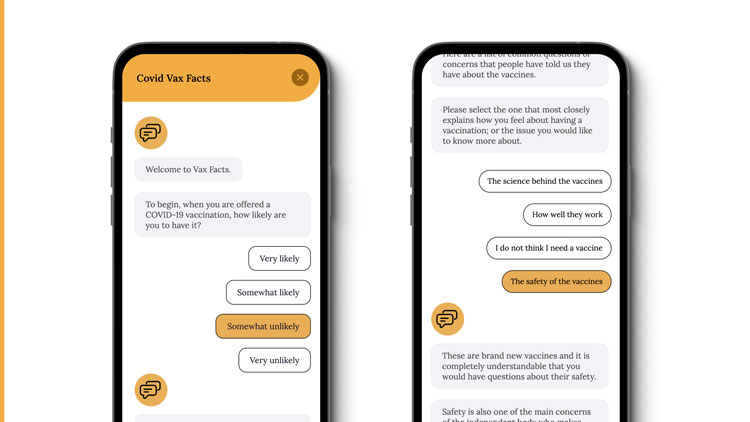Rehab designs chatbot experience to battle Covid vaccine hesitancy
Covid Vax Facts is an “innovative online chatbot” developed by the studio and the University of Nottingham to tackle misinformation and conspiracy theories.
London-based creative tech studio Rehab has designed a chatbot experience in a bid to tackle misinformation surrounding the roll out of coronavirus vaccines.
Some 90% of the UK population need to take the vaccine in order to achieve herd immunity, Rehab says. However, misinformation and conspiracy theories present an obstacle – and an estimated one in five people are still unsure about having the jab.
Developed in partnership with the University of Nottingham, Covid Vax Facts is a “conversational interface”, according to the studio, which interacts with users in an “objective, non-judgemental” way.

“We can make technology a part of the solution”
Covid Vax Facts is accessed online. Rehab CEO Rob Bennett says using digital tech in the fight against misinformation is crucial. “Digital technology, and social media in particular, contribute to the vaccine hesitancy issue, so it’s vital that we consider how we can make technology a part of the solution and work for society – rather than against it,” he says.
As users visit the tool’s homepage, they are met with a selection of curated questions, which are relevant to what’s happening in the news.
The “key questions” currently on the website include: “Does the Astra-Zeneca vaccine cause blood clots?”, “Can I have a COVID-19 vaccine during Ramadan?”, and “Do I need a second jab?” Clicking on these presents users with detailed answers. Rehab says the aim is to talk users through “what is known and what isn’t, with scientific evidence presented in an accessible way”.
Bennett explains: “The idea is that NHS workers would need to individually speak to each person in order to change their mind about the vaccine, but this one chatbot could potentially save countless hours of resource in times of extreme pressure.”
How it works
Once the user enters into the chatroom, they’re asked how likely they are to have the vaccination when they’re offered it. Depending on their answer, the chatbot replies with a selection of questions and concerns that a person might have about getting a Covid vaccine.
Those that respond saying they’re “very unlikely” to get the jab can choose from options like covering safety, efficacy and the science behind the vaccine.
Each of these is then further broken down. For those worried about the safety of the vaccine, for example, the bot asks whether they’re most concerned about unknown side effects, the “rushed” process or the science more generally.
Once the user has been presented with an answer, they are invited to “explore another concern”. At the end of their chatbot experience, users are then asked again how they feel about having the vaccine.
The process of developing the interface was the same as the studio’s other work with brands like Nike and Google, Bennett says. “[We worked] closely alongside the university to deliver an experience that is useful and valuable to them,” he says.

“Inform vital interventions in the coming months”
The information provided to the users of Covid Vax Facts comes from “expert, independent doctors and scientists,” according to the studio.
As well as providing immediate information for users, the chatbot also collects anonymous data on the responses. According to Rehab, this will allow the university’s research team to spot influencing factors – like age, ethnic group and social class.
This data could “inform vital interventions in the coming months”, the studio says.
Additionally, the success of the chatbot could have potentially significant ramifications for other medical treatments, Bennett says. “The scope for this type of digital intervention is huge,” he says. “It could be used in the future to help people make a more informed decision on whether or not to accept fairly critical medicines, treatments and other vaccines.”
Those wishing to use the chatbot can do so via the Covid Vax Facts website.
-
Post a comment





